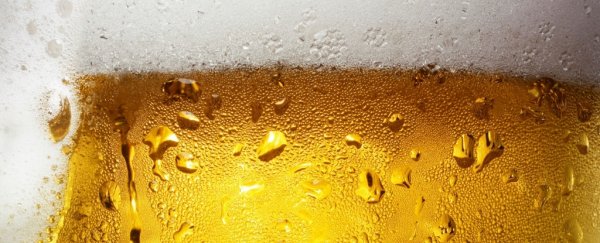A rare syndrome in which the human gut brews its own alcohol has been successfully treated with a poop transplant when nothing else was working, marking the first such case in medical literature.
Known as auto-brewery syndrome (ABS), this extraordinary condition can leave patients feeling downright intoxicated, even if they haven't had a single thing to drink.
ABS is caused by microorganisms - usually fungi - in the gut feasting on recently-eaten carbohydrates to produce their own brew of alcohol.
Most of us have these fermenting microbes in small quantities, but in ABS the microbe populations and therefore the fermentation can grow out of control. This can sometimes occur after a course of antibiotics throws the gut balance off.
Initially, this is what brought a 47-year-old man to the hospital in Belgium. Since finishing a dose of antibiotics, he had been experiencing unexplained moments of inebriation. And it had been going on for two months.
The patient told doctors he hadn't consumed a drink in four days, and yet upon further testing, his blood ethanol levels were more than 17 times what's considered normal, or twice the legal limit in the United States.
Doctors diagnosed him with gut fermentation syndrome, or ABS, and prescribed oral anti-fungals and a low-carb diet. But it only helped a little. Even an increased dose of the high-potency anti-fungal medication amphotericin taken for four weeks appeared unsuccessful: The patient still felt inebriated and his wife reported she could smell the alcohol on his breath.
After he was ticketed for drunk driving at a random police check, the patient and his doctors decided to try something more drastic: a faecal microbiota transplantation, more commonly known as a poop transplant.
In recent years, poop transplants have been proposed as a promising new way to re-balance gut microbiota among certain groups of people. That said, they appear to only work against some infections, and there are potentially life-threatening risks that need to be taken into consideration.
However, the man was willing to try it, and the sample was voluntarily donated by his 22-year-old daughter. Luckily, the poop transplant worked wonderfully. Nearly three years later, the patient still remains free of ABS symptoms, and his blood ethanol levels have returned to normal. He even got his driver's license back.
On occasion, the doctors note, the patient still enjoys a beer and a buzz, but only when he wants to.
"On the basis of our experience with this patient, we advise other clinicians who have patients with gut fermentation syndrome to consider treatment with faecal microbiota transplantation, especially if more traditional therapy has failed," the team writes in their case study.
"Moreover, we can imagine a future point - after additional research to evaluate the safety of faecal microbiota transplantation - at which this approach might become standard therapy for gut fermentation syndrome."
While dietary changes, drug therapy and probiotics are usually enough to treat ABS, in some resistant cases, we might need a more extreme approach. Faecal transplants are a promising avenue for more research.
The study was published in the Annals of Internal Medicine.
